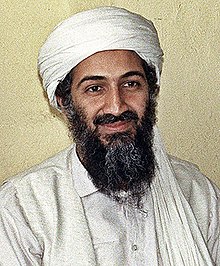Al-Qaeda
Al-Qaeda, also al-Qaeda (Arabic القاعدة, DMG al-qāʿida 'the base, the foundation' [alˈqaːʕɪda], in pronouncements also Tanzīm Qāʿidat al-Jihād / تنظيم قاعدة الجهاد / tanẓīm qāʿidat al-ǧihād / 'Jihad Base Organization'), is a loose, globally operating terrorist network of mostly Sunni Islamist organizations that has perpetrated numerous terrorist attacks in several states since 1993, usually in conjunction with confessional statements, and has been linked to numerous world political events. Many of the attacks carried out by the network are considered terrorist mass murders of civilians.
The organization first came to the attention of the world public after the bombing of the World Trade Center in 1993 and the foiled mass murder known as Operation Bojinka during World Youth Day in Manila in 1995. Since the terrorist attacks of September 11, 2001, it has helped determine world events as a permanent Islamist threat. The declared aim of al-Qaida is the establishment of a state of God for all "orthodox believers", encompassing all Islamic countries and territories as well as other territories. Its intermediate goals are to wage war on Western states, which it believes are leading a worldwide anti-Islamic conspiracy, and to bring about the destruction of Israel.
Al-Qaeda is considered a terrorist organization by the United Nations, and Member States are required to enforce sanctions against individuals and groups associated with it. In addition, al-Qaeda is designated as a terrorist organization by the European Union, its members, and numerous other states and organizations. Al-Qaida is judged to be the first transnational terrorist organization by Germany, among others, through the German Office for the Protection of the Constitution, and in the United States, where it is considered a "prototype" for this type of terrorism.
On May 2, 2011, the organization's founder and ideological leader, Osama bin Laden, was killed by American forces in Operation Neptune's Spear in Abbottabad, about 50 km from the Pakistani capital Islamabad.

Flag of al-Qaida in Iraq
Spelling and pronunciation
So far, no uniform spelling of the name can be observed in German. The Duden lists the spellings Al Kaida and al-Qaida, but refers to the main entry Al Qaeda. In the German-language press, other spellings can be found, such as al-Qaeda, al-Kaida, or al-Qaeda (as is often the case in the U.S. media). The German-language news agencies have meanwhile agreed on the spelling Al-Qaeda. The reason for the many variants lies in the problem of transcription from Arabic, especially since the first consonant (Qaf) has no counterpart in German and English.
Since the name has two sounds foreign to German (and many other languages) (the addressed qaf and the ʿAin), the correct pronunciation is difficult for non-native speakers of Arabic. The qaf ([q], ق) is pronounced like a "Zäpfchen-k" (at the point where the ach sound is articulated in standard German and Swiss German), and the ain ([ʕ], ع) is a voiced pharyngal or pharyngeal sound that transitions from the long vowel a into the short vowel i. However, Arabic pronunciation is approximated by pronouncing the first consonant (q/k) as k; the following a and i are pronounced as diphthongs, but the a is much longer to speak than the i. The i may be spoken as a short e to mimic the influence of the ain. The stress is on the first syllable. (This results in the pronunciation al kaaida or al kaaeda, with the stress on the kaa syllable).
Background
The emergence of al-Qaeda is linked to the onset of the Islamic Awakening in the early 1970s. Ideologically, the movement was largely influenced by Sayyid Qutb's writings, particularly his pamphlet Signs on the Way. According to Mohammed Jamal Khalifa (1957-2007), a schoolmate and relative of Osama bin Laden, reading Qutb's books shaped his entire generation. The most significant influence within Qutb's ideology was his view that many people who call themselves Muslims are actually deniers of God.
Since the early 1980s, the Palestinian theologian Abdallah Azzam had been campaigning from Pakistan for financial and personnel support for the mujahideen's fight against the Soviet occupation of Afghanistan and also provided an ideological foundation for the jihad in Afghanistan. In 1983, the Kuwaiti journal al-Mujtamaʿ published a fatwa by him in which he declared support for this struggle to be an obligation for every Muslim. This is also the theme of his writing published in 1984 entitled "The Defense of the Land of Muslims is the Most Important of Personal Duties" (Ad-difāʿ ʿan arāḍī al-muslimīn ahamm furūḍ al-aʿyān).
Together with Osama bin Laden, Abdallah Azzam opened a service office in Peshawar in 1984 in order to be able to receive, look after and organise the young men coming from the various Arab countries who wanted to go to Afghanistan for the jihad.

Osama bin Laden Founder and leader of al-Qaeda until his death on May 2, 2011.
Questions and Answers
Q: What is al-Qaeda?
A: Al-Qaeda is an armed Islamic group that was started between August 1988 and late 1989. It works as a network, as a stateless army, and a radical Sunni Muslim movement calling for global Jihad. Most of the world thinks it is a Takfiri and a terrorist organization.
Q: What are some of the most well-known attacks by al-Qaeda?
A: Some of its most well-known attacks have been the September 11 attacks, the bombings of U.S. embassies in Kenya and Tanzania in 1998, and the attack on the U.S. Navy ship USS Cole in 2000. al-Qaeda has done suicide attacks and simultaneous (at the same time) bombings of different targets.
Q: What are some of al-Qaeda's goals?
A: Among al-Qaeda's goals is for other countries to stop influencing Muslim countries and for a new Islamic caliphate to be made. There have been reports that al-Qaeda believes that Christian and Jewish Islamophobia is trying to destroy Islam and that the killing of bystanders and civilians is religiously justified in jihad.
Q: How many operatives does al-Qaeda have?
A: There have been guesses that there are 500–1,000 operatives in Afghanistan and around 5,000 worldwide; however, there is no confirmation of this number yet.
Search within the encyclopedia